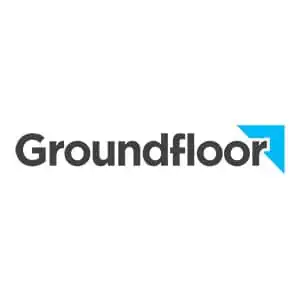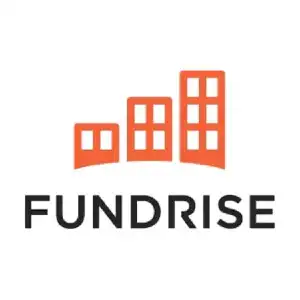We have great news if you’ve always dreamt of investing in real estate. Groundfloor offers real estate investment opportunities for non-accredited investors with as little as $10!
It sounds incredible and can be. In our Groundfloor review, we help you understand everything you should know about the platform to determine if it’s a good fit.
Like any investment, you should always do your due diligence before investing.

Table of Contents
What Is Groundfloor Real Estate Investing?
Groundfloor offers an option for the everyday investor to begin real estate investing. You don’t need a lot of money or experience. You also don’t need to own real estate yourself. Instead, with just $10, you can invest in fractional shares of fix-and-flip residential real estate that other investors own, lending money to these real estate investors to reach their goals.
When you invest with Groundfloor, your investment is in real estate loans in the first lien position. This provides reassurance that should the borrower default; you are first in line to receive compensation.
When you lend to fix-and-flip investors, you’re helping them build a solid real estate portfolio. While you don’t earn any of the properties’ equity, you get paid an interest rate that correlates with the loan’s risk.
How Does Groundfloor Work?
- Short-term Investments
- Low Minimum Investment
- No Investor Fees
- Variety of Investment Options
- Higher Risk of Loan Default
- No Equity Investing Option
- Lack of Diversification
Interested borrowers apply to Groundfloor to request loans to fund fix-and-flip properties. Groundfloor lends to them directly from their platform using the funds provided by investors like you.
So essentially, investors like you act like the bank. You choose which loans you’re comfortable investing in and can invest with as little as $10. This makes it easy for real estate investors to diversify their investment portfolios.
Most Groundfloor loans are short-term loans, repaying investors in six to nine months. You know the rate of return before you invest, and if the borrower defaults, Groundfloor works with them to get back on track or starts foreclosure proceedings.
Since you’re investing in debt in the first lien position, your debt would be a priority to be repaid. But again, because you’re lending to people borrowing money, there is a risk of loss.
When you invest in Groundfloor, you invest in a Limited Recourse Obligation, LRO. In other words, it’s a debt security that Groundfloor issues. The LRO’s performance depends on how well the borrower repays the debt. So your investment makes you a creditor to Groundfloor, who pays you when borrowers pay them.
Groundfloor is located in 32 states and intends to go nationwide. It is registered with the Securities and Exchange Commission (SEC) and has a robust due diligence program that approves a small percentage of loans presented to them.
You may also like: 11 Best Real Estate Investing Apps
Understanding Groundfloor Loans: What Is Loan Grade?
If you want to try investing in real estate with Groundfloor, you should understand the loan grade and how Groundfloor comes up with them as you choose which loans you’re most comfortable investing in.
Groundfloor has a rating system from A to G for its loans. Grade A loans have the lowest risk but pay the lowest interest rates. On the other hand, Grade G loans are the riskiest but pay the highest interest rates.
A solid investment strategy for most real estate investors is to diversify their portfolio, mixing it up with low-risk and high-risk investments. This ensures your investment portfolio isn’t dependent on one investment or even one type of investment. For example, if you have a few Grade A loans, you have a higher guarantee of repayment than Grade G loans, but if the G loans don’t default, they have the highest rate of return.
Groundfloor Filtering Criteria
In addition to the loan grade, you can consider other investment criteria when choosing the right real estate loans.
- Interest rate – The higher the interest rate, the more you’ll earn. With Groundfloor, the returns are fixed, so as long as the borrower doesn’t default, you know how much you’ll make.
- After-repair-value – This compares the loan’s value to the home’s value after repairs. Since you’re investing in fix-and-flip properties, they should be worth more after the renovations are complete.
- Equity – The larger the difference between a home’s value and the loan amount, the less risky it is for investors. Equity is the real estate investor’s investment in the property and what they stand to lose.
- Location – Whether the property is in a judicial or non-judicial state determines how Groundfloor can proceed with foreclosure proceedings if the borrower defaults.
- Borrower experience – Borrowers are rated on a scale of 1 to 5 to show how little or much real estate investing experience they have. The more experience an investor has, the less likely they are to get in over their heads.
- Borrower commitment – Borrowers investing in real estate full-time may be more dependable than investors doing it part-time.
As an investor on Groundfloor, you can filter the available investments by any of the above criteria based on your own investment criteria. For example, if you have a specific interest rate in mind or only want to take a certain level of risk, you can filter by these factors to find the best opportunities.
Do You Need to Be an Accredited Investor?
Fortunately, you don’t need to be an accredited investor to invest in Groundfloor. It’s open to all investors over 18 with at least $10 to invest in real estate. However, you must be willing to accept the risk that occurs when you loan money but have the potential to earn consistent returns.
How to Start Using Groundfloor
Groundfloor is easy to start investing in, and because you don’t need to be an accredited investor, anyone can use it.
Create Your Account
Creating a Groundfloor account is free; you can immediately see the available loans. If you want to see what Groundfloor is about or compare it to other investment vehicles, you can check it out by signing up.
Transfer Funds
Next, you must transfer funds to invest in real estate. Again, the minimum investment is low at $10, but the more you invest, the greater returns you’ll enjoy.
You can link an external checking or savings account to transfer funds to continue investing automatically.
Browse Real Estate Projects
When you’re ready to invest, browse the available projects. Click on any project you’re interested in to get more details. Groundfloor is 100% transparent, providing all the necessary details to help you decide, including the loan grade, interest rate, maturity date, LTV, and repayment terms.
Get Paid
The best part is when you get paid! You might receive interest payments monthly or deferred payments when the project finishes. Read the terms of the investment before deciding.
Groundfloor Features
Understanding the Groundfloor features can help you determine if this platform, open to non-accredited investors, suits you.
Minimum Investment Required
Most real estate investments require a lot of capital, sometimes thousands of dollars. Groundfloor, however, has a low minimum investment requirement of $10. This makes it easy for anyone to invest in real estate investments and allows you to diversify your investment across many investment properties to reduce the risk of loss.
Time Commitment
Most Groundfloor investments are short-term, ranging from six to nine months. Because each loan differs, read the fine print to ensure you understand the time commitment required. Don’t tie up funds you’ll need before the loan’s maturity date.
Types of Properties
If you’re looking for commercial real estate investments, you won’t find them on Groundfloor. Instead, most loans are in residential real estate projects, usually fix-and-flip properties. They are short-term loans because most fix-and-flip investors want to renovate the home and sell it fast, earning a profit and moving on to the next opportunity.
Real Estate Investment Type
All offerings on Groundfloor are debt investments. You lend money to Groundfloor, which lends to real estate investors or property owners, fixing and flipping properties for a profit.

What Are the Risks of Groundfloor Real Estate Investments?
All investments have risks, but Groundfloor real estate investments have unique risks that other real estate investments might not.
Because you’re investing in debt, you run the risk of the borrower not paying. To get your money back, Groundfloor must be able to take possession of the property and sell it. This can take time and isn’t an option in all states, depending on whether they are a judicial or non-judicial state.
When you choose investments, you’re looking at the interest payments and the investor’s experience and know-how. You’re putting your faith in a real estate investor to have a good business model, choose suitable properties, and be able to fix and sell them for a profit to repay their loan.
How Much Does Groundfloor Charge?
Another great thing about a Groundfloor account is that there aren’t any investor fees. Instead, the borrowers pay fees for borrowing money from Groundfloor. Borrowers pay an application fee plus closing costs, including an origination fee of 2% – 4.5% of the loan amount.
Finally, Groundfloor makes money by keeping a portion of the interest payments received from each borrower. This is called the ‘spread’ and is the difference between the payments Groundfloor collects and the amount they pay investors.
What Are the Average Returns on Groundfloor?
No investment has guaranteed returns, but on average, Groundfloor investors earn a 10% rate of return. Of course, your returns depend on the risks you take and the loan grade of the chosen investments. If you diversify your investment portfolio and take some low and high-risk loans, you’ll usually average a 10% return.
Pros and Cons for Groundfloor Investors
The real estate market, as does the Groundfloor investment platform, has its ups and downs. Here’s what you should consider.
Pros
- No investor fees
- Short term investments
- Low minimum investment requirement
- You can be a non accredited investor
Cons
- Only debt investments are available
- The risk of default can be high
- You’re putting your trust in other real estate investors
Who Shouldn’t Use Groundfloor?
There are a few types of people that shouldn’t use Groundfloor.
First, investors who need liquid investments shouldn’t use Groundfloor. While most investments are short-term, you must keep your capital tied up until the borrower repays the loan. Find an alternative investment if you need the funds for everyday use or an upcoming expense.
Second, anyone with a low-risk tolerance shouldn’t start investing with Groundfloor. While Grade A loans are the lowest risk, there is still a risk. You’re relying on other real estate investors to pay their loans. This isn’t like the stock market, where you can hold onto your investments long-term, and hopefully, the market will turn itself back around.
Is Groundfloor Transparent?
Sometimes investment platforms aren’t transparent in the amount you’ll earn and the risk, among other factors, but Groundfloor is about as transparent as they come. You know the exact interest rate you’ll make, and you’ll see every detail about the loans before investing in them to ensure you understand the risk.
In addition, each month, Groundfloor publishes reports on all loan repayments and asset management activities. This ensures all investors understand where their loans stand.
Is Groundfloor Legit?
Groundfloor has funded millions of dollars worth of real estate loans and funded thousands of projects. Of course, like any investment opportunity, there is the risk you’ll lose money, but that’s the risk with any investment.
Groundfloor Reviews
Groundfloor has 4.2 out of 5 stars on Trustpilot. Here are some of the reviews, good and bad.
“I’ve been investing for over three years now. Yes, it is taking longer to get repaid, but it’s Real Estate. Therefore, it’s taking longer for investors to get permits and work completed. This is something everyone needs to be realistic about when investing. Since investing, I have seen foreclosures on properties, but GF has always paid their debt to the investors.”
“Groundfloor provides an easy way to set up a diversified investment into various real estate properties. You can choose your level of risk from lower-yielding A-rated projects and higher yields with B, C, and D, and lower-rated and higher-yielding projects available. An Auto-Invest bot can make selections for you if you wish. Pretty pleased with my account in my almost year of investing there.”
“Groundfloor offers an innovative way to invest in real estate loans. I have been investing through their platform for nearly two years. I have invested in both notes and LROs. While I have not lost money on any investment, I find that the quality of the investments seems to be declining over time. Over 90 percent of my investments are in the ‘extended’ or ‘default’ categories.”
Alternatives to Groundfloor Investing
It’s essential to analyze your investment options to ensure Groundfloor suits you. But, of course, it’s not the only real estate investment platform. Here are a few competitors to consider.
Fundrise
Fundrise makes it easy for anyone to get started as a real estate investor. Available in all 50 states, started in 2010 - Fundrise has become one of the most popular eREIT investments available.
- Small Minimum Investment Requirement
- IRA Accounts Available
- Open to ALL Investors
- Variety of Investment Options
- User Friendly Platform
- Difficult to Understand Fee Structure
- Illiquid
- More Complex Investments Requiring Diligence of Investors
Fundrise is a popular Groundfloor alternative investment option because they, too, only require a $10 minimum investment. However, you invest in commercial and residential real estate equity instead of debt.
Groundfloor pays dividends quarterly, as well as other profit-sharing payments. However, unlike Groundfloor, Fundrise charges investors a 1% investment fee.
PeerStreet
- Automated Investing based on Preferred Criteria
- Variety of Investment Options
- Transparency
- Must be an Accredited Investor
- Debt Investing Only
- High Minimum Investment
PeerStreet is a lot like Groundfloor. On this platform, you invest in short-term real estate loans. There are two significant differences, though. First, you must be an accredited investor with at least $1,000.
Most investors on PeerStreet are investment property owners looking for financing to upgrade their properties and make more money on rent. As a result, the risk in lending money to borrowers who already own homes is slightly lower than the fix-and-flip audience Groundfloor lends to.
Arrived
Arrived is another investment platform that allows you to invest in residential properties, but with a minimum investment of $100. Again, instead of investing in debt, you invest in the home’s equity, owning a fraction based on your investment.
The funds collected from investors help Arrived purchase and manage rental properties. You don’t have to do any of the work involved with the properties but earn money from the rental income and property appreciation.
FAQs
Groundfloor can pave the way to successful investing in real estate, whether you want to invest $10 or more.
How Can You Contact Groundfloor?
You can contact Groundfloor customer service via email or phone, depending on your needs and preference:
- Investor support – 404-850-9223 or support@groundfloor.us
- Borrower services – 404-850-9224 or borrower@groundfloor.us
How Can You Reduce Your Risk in a Ground Floor Investment?
It’s essential to diversify your investments when investing with Groundfloor. While the loans are backed by the properties the investors purchase, there’s still a risk of nonpayment and loss.
Investors should be selective about their chosen loans to reduce the risk of loss. Look for investors with experience in real estate projects, have money invested in the project themselves, and have a history of repaying their loans.
Having a mix of low-risk (Grade A) and high-risk (Grade G) loans is also a good idea.
Is Groundfloor FDIC Insured?
When you deposit funds in your Groundfloor account, the cash sits in a partner bank. Groundfloor isn’t a bank; all banks they partner with are FDIC insured. So if any of the banks go out of business that holds your cash, you won’t lose the funds. However, this doesn’t guarantee that your investments on Groundfloor won’t lose money.
Is Groundfloor an REIT or Real Estate Crowdfunding?
Groundfloor isn’t an REIT or real estate investment trust company. However, they are a real estate crowdfunding platform. They were one of the first crowdfunding sites to become SEC approved.
Groundfloor Review: The Bottom Line
This Groundfloor review offers insight into both the good and the bad sides of Groundfloor. But as a real estate investment platform, it offers quite a punch, opening up the opportunity for everyday investors to invest in real estate projects.
Like any investment, know the risks, research, and diversify as much as possible to ensure you get the rate of return you desire.
Samantha Hawrylack is a personal finance expert and full-time entrepreneur with a passion for writing and SEO. She holds a Bachelor’s in Finance and Master’s in Business Administration and previously worked for Vanguard, where she held Series 7 and 63 licenses. Her work has been featured in publications like Grow, MSN, CNBC, Ladders, Rocket Mortgage, Quicken Loans, Clever Girl Finance, Credit Donkey, Crediful, Investing Answers, Well Kept Wallet, AllCards, Mama and Money, and Concreit, among others. She writes in personal finance, real estate, credit, entrepreneurship, credit card, student loan, mortgage, personal loan, insurance, debt management, business, productivity, and career niches.




